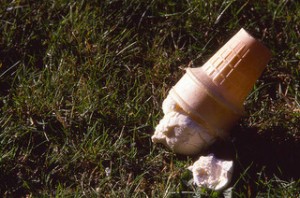You’re up late studying for midterms, desperately trying to avoid blinking for fear of falling asleep. As a quick pick-me-up you reach for a piece of Halloween candy. You open the wrapper and in your sleep-deprived state, your candy falls to the floor. According to an old wives tale, you have approximately 3-5 seconds to grab your tasty treat before it becomes covered in bacteria and whatever else might want a bite. Your candy is sitting on the floor, helpless. Regardless of whether it’s two seconds after you dropped it or six, you pick it up. Apart from the stray fluff from your fuzzy socks, it looks relatively unharmed. Now, the big question: do you eat it?
According to researchers, the answer is a resounding NO. Bacteria and other microorganisms immediately contaminate food that falls to the floor. There are some factors to take into account but in general, it is safer to ditch the dropped food. This is why some researchers think we should be using a ‘when in doubt, throw it out’ philosophy as opposed to the mythical ‘five second rule’.
Two factors that determine how many bacteria end up on your food are the moisture content of the food and the cleanliness of the surface upon which it falls. Moist food, such as cheese or meat, is quite easy for bacteria to stick to and ends up with higher bacteria contamination when dropped. Bacteria have a more difficult time with dry food, such as crackers or cookies, which don’t become contaminated as easily. As for the surface in question, obviously a cleaner surface will have less bacteria and a lesser chance of contaminating dropped food. Watch here as Dr. Philip Button outlines his take on these two factors:

But what about the length of time food is left on the floor? It has been shown that the difference in amount of bacteria on food that was left for two seconds or six seconds is not significant. If bacteria are there, they are going to be on that food faster than you can react.
And what about wiping it off? Or rinsing it with water? Once food has been dropped or has touched something it shouldn’t, there is really no way to get it back to its original state. Wiping or rinsing may get rid of some bacteria, but it cannot get rid of them all.
So if you drop a piece of dry food on a clean surface, what’s the big deal? As clean as the surface may be, you don’t really know which bacteria are present. The bacteria that end up on the food may require only a small number of organisms to be present in order to cause disease, which could be costly for someone with a weak immune system.
The next time you drop a piece of food on the floor, think about the circumstances under which it is falling and who will be eating it. Remember: when in doubt, throw it out!
-Karly Stillwell



5 responses to “When in doubt, throw it out!”